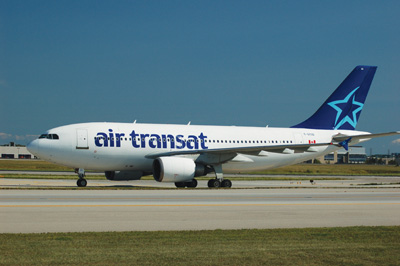
Features
Airlines
At The Gate: A sunny outlook
Despite the recession, Canadian tourists flocked to Europe at an unexpected pace this past summer due to pent-up demand and a weak euro and British pound.
November 3, 2010 By Brian Dunn
Despite the recession, Canadian tourists flocked to Europe at an unexpected pace this past summer due to pent-up demand and a weak euro and British pound. Bookings increased 12 per cent from last summer, according to Flight Centre Canada, one of Canada’s largest travel agencies.
 |
|
Overall, air travel has been improving steadily over the past few months, providing a much-needed boost to tour operators and airlines across the country. As a result, Transat A.T., the country’s largest travel tour operator, posted its best ever third-quarter earnings per share, excluding one-time items, surpassing analysts’ expectations.
“International tourism remains resilient, people continue to show an inclination to travel,” said Transat’s CEO Jean-Marc Eustache. “It’s quite unbelievable. At the end of the day, even in a recession, people continue to travel.”
Eustache said in his 33 years in the travel tour business, he has never flown as many passengers between Canada and the U.K. as he did this summer. And while he anticipates higher revenues and “significantly higher” margins in the fourth quarter compared with the previous year, it is still too early to comment on what this winter may hold. But the company intends to increase its capacity across the Atlantic by 15 per cent in the fourth quarter and is filling its planes at similar levels with higher prices despite that increase.
Analyst Claude Proulx of BMO Capital Markets in Montreal called Transat’s earnings “its best ever [third quarter] so far. We see the solid bookings and pricing on the Canada-Europe market as positive since they point to strong [fourth-quarter] results,” he said in a note to clients. Proulx added that while Transat is facing tougher comparables in the fourth quarter after a strong performance last year, the large increase in capacity should translate into “lower average cost, in addition to the fact that the fourth quarter typically shows sequential growth.”
The Montreal-based company is continuing to modernize its fleet. It has signed an agreement with lessor CIT Aerospace International for the long-term lease of two Airbus A330 wide-body airliners. The fleet now comprises 13 A310s, which are being gradually withdrawn from service, and five A330s. Three more A330s will arrive by year-end and one next year, bringing the total to nine. Air Transat’s fleet provides 50 per cent of the tour company’s overall needs. It uses more than 60 airlines to provide the rest, including Canjet for the South from Canada, Transavia for medium-haul from France and Thomas Cook Airlines for long-haul transatlantic flights.
By 2014, the company’s objective is to be “a leading tour operator in the Americas, with a solid competitive position in several European countries,” according to a recent presentation to investors. To get there, the company plans to focus on product differentiation, increase control over its sales distribution network and open new markets in the Americas and Southern Europe, among other initiatives.
The transatlantic market, particularly the U.K. and France, accounts for about 65 per cent of its revenue. Between 2006 and 2010, it increased its share of the Canada-U.K. travel market to 25.7 per cent from 21.6 per cent, and to 34.2 per cent from 26.8 per cent for the Canada-France market.
Air Canada also increased its market share between Canada and the U.K during the same period, in part due to the demise of Zoom Airlines, but saw its Canada-France share drop.
Early indications point to a good winter travel season for Transat as both consumer confidence levels and travel intentions remain positive. Its market share to sun destinations last winter dipped slightly to 32 per cent from 32.3 per cent the previous year, but that’s because of increased competition, particularly from WestJet.
Transat’s approach for the coming winter includes doubling air-only sales (minus hotels) in certain markets, offering a “luxury package” option, making its products available earlier and giving price guarantees on certain exclusive hotels. In addition, it wants to increase controlled sales through its travel agents and websites and offer a loyalty/incentive program for travel agents.
As part of its objectives, the travel company wants to have the most efficient aircraft for a given route and the ability to expand or contract capacity, depending on demand fluctuation or external events affecting each of the 60 destinations it serves.
Brian Dunn is a Wings writer and columnist.